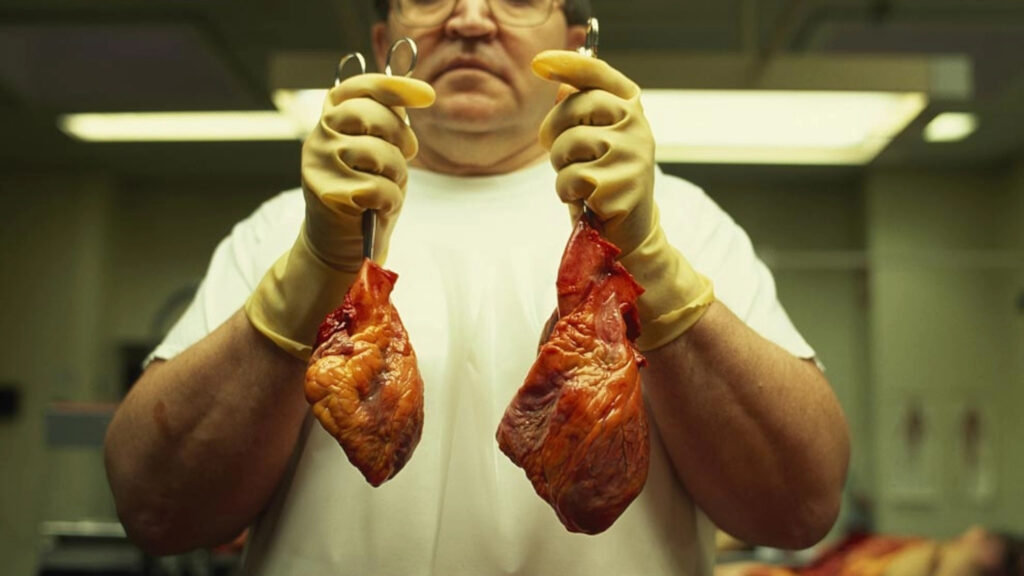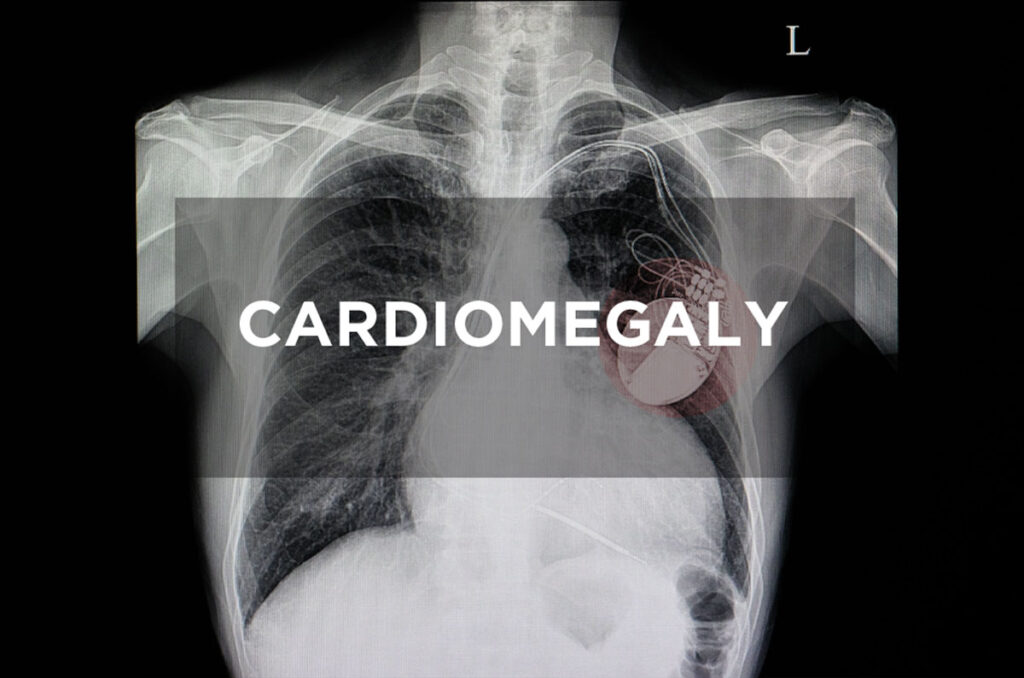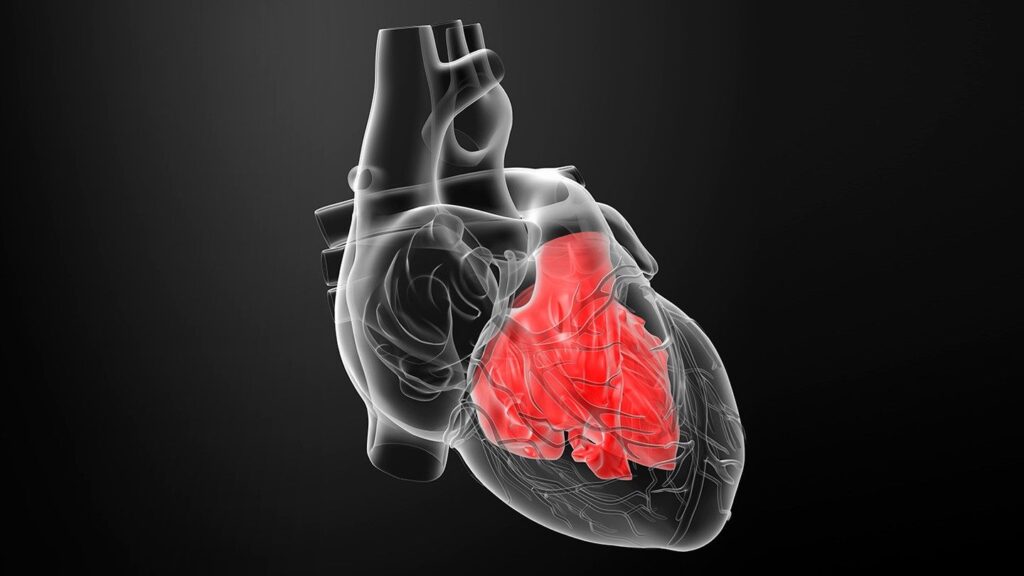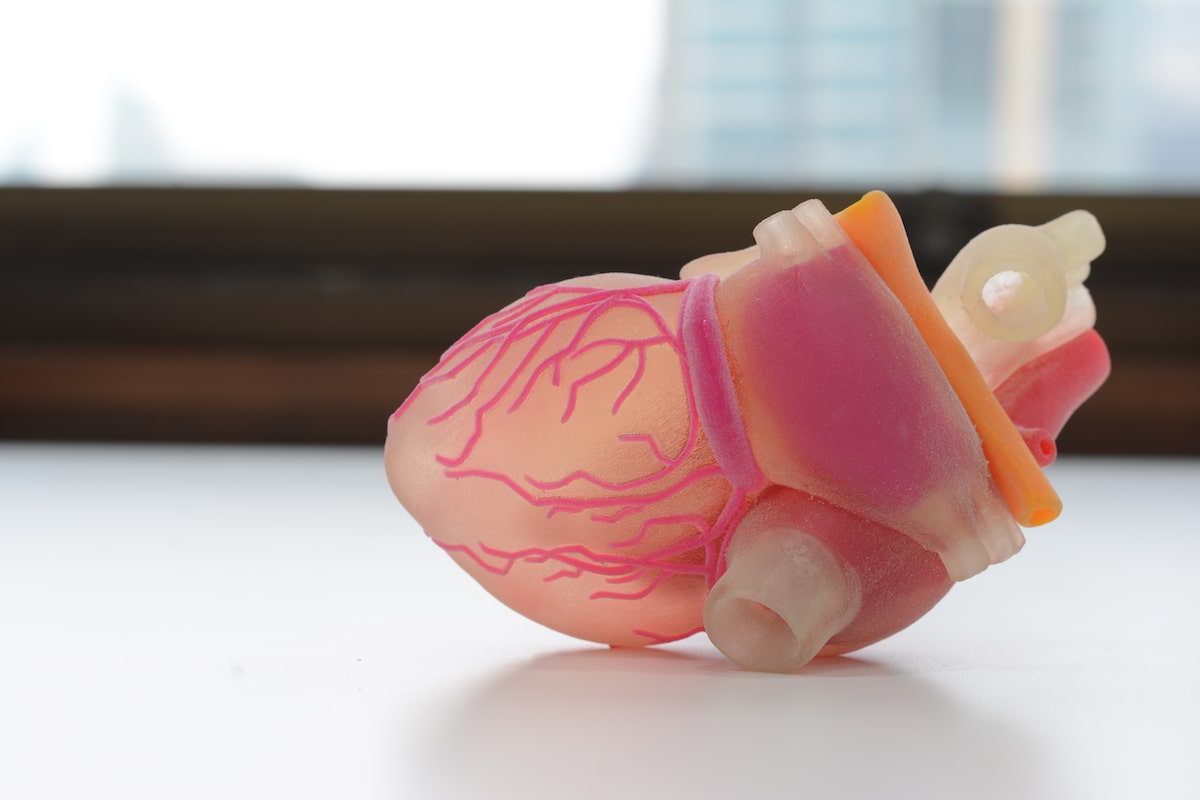WHAT IS AN ENLARGED HEART?
An enlarged heart (cardiomegaly) is not an illness, but rather a sign of another condition.
The term “cardiomegaly” means an enlarged heart shown on any imaging test, including a chest X-ray. Other tests are then required to diagnose the condition that is causing the heart to be enlarged.
An enlarged heart might be the outcome of short-term stress on the body, like pregnancy, or a medical state, like the weakening of the heart muscle, coronary artery disease, heart valve problems, or abnormal heart rhythms.
Specific conditions might cause the heart muscle to become thicker or cause one of the chambers of the heart to dilate, making the heart enlarge. Depending upon the condition, an enlarged heart might be temporary or permanent.
An enlarged heart might be treatable by correcting the cause. Treatment for an enlarged heart could include medications, medical procedures, or surgery.

ENLARGED HEART SYMPTOMS
For certain people, an enlarged heart causes no signs or symptoms. Others might have these signs and symptoms:
- Shortness of breath
- Abnormal heart rhythm (arrhythmia)
- Swelling (edema)

WHEN SHOULD YOU SEE A DOCTOR?
An enlarged heart is easier to treat when it is detected early, so talk to your doctor if you have concerns about your heart.
Look for emergency medical care if you have any of these signs and symptoms, which might mean you are having a heart attack:
- Chest pain
- Discomfort in other regions of the upper body, including one or two arms, the back, neck, jaw, or stomach
- Severe shortness of breath
- Fainting
If you have new signs or symptoms that may be associated with your heart, make an appointment to see your doctor.
ENLARGED HEART CAUSES
An enlarged heart could be caused by conditions that cause your heart to pump harder than usual or that damage your heart muscle. Sometimes the heart gets enlarge and becomes weak for unknown reasons. This is called idiopathic cardiomegaly.
A heart condition you are born with (congenital), damage from a heart attack, or an abnormal heartbeat (arrhythmia) could cause your heart to enlarge. Other conditions related to an enlarged heart include:
- High blood pressure – Your heart might have to pump harder to deliver blood to the rest of your body, enlarging and thickening the muscle.
High blood pressure could cause the left ventricle to enlarge, causing the heart muscle ultimately to weaken. High blood pressure might also enlarge the upper chambers of your heart. - Heart valve disease – Four valves in your heart let the blood circulate in the right direction. If the valves are damaged by conditions like rheumatic fever, a heart defect, infections (infectious endocarditis), an irregular heartbeat (atrial fibrillation) connective tissue disorders, specific medications, or radiation treatments for cancer, your heart might enlarge.
- Cardiomyopathy – This disease of the heart makes it difficult for your heart to pump blood throughout your body. As it progresses, your heart might enlarge to try to pump more blood.
- High blood pressure in the artery that joins your heart and lungs (pulmonary hypertension) – Your heart might need to pump harder to move blood between your lungs and your heart. As a result, the right side of your heart might enlarge.
- Fluid around your heart (pericardial effusion) – Accumulation of fluid in the sac that contains your heart might cause your heart to appear enlarged on a chest X-ray.
- Blocked arteries in your heart (coronary artery disease) – With this condition, fatty plaque in your heart arteries block blood flow through your heart vessels, which could lead to a heart attack. When a part of the heart muscle dies, your heart has to pump harder to get sufficient blood to the rest of your body, causing it to enlarge.
- Low red blood cell count (anemia) – Anemia is a condition in which there are not enough healthy red blood cells to carry sufficient oxygen to your tissues. Untreated, chronic anemia could lead to a rapid or irregular heartbeat. Your heart should pump more blood to make up for the lack of oxygen in the blood.
- Thyroid disorders – Both an underactive thyroid gland (hypothyroidism) and an overactive thyroid gland (hyperthyroidism) could lead to heart problems, including an enlarged heart.
- Excessive iron in the body (hemochromatosis) – Hemochromatosis is a disorder in which your body does not properly metabolize iron, causing it to accumulate in various organs, including your heart. This could cause an enlarged left ventricle due to the weakening of the heart muscle.
- Rare diseases that could affect your heart, like amyloidosis – Amyloidosis is a condition in which abnormal proteins circulate in the blood and might be deposited in the heart, interfering with your heart’s function and causing it to become bigger.

ENLARGED HEART RISK FACTORS
You might be at increased risk of developing an enlarged heart if you have any of the following risk factors:
- High blood pressure – Having a blood pressure measurement of more than 140/90 millimeters of mercury.
- A family history of enlarged hearts or cardiomyopathy – If an immediate family member, like a parent or sibling, has had an enlarged heart, you might be more vulnerable.
- Congenital heart disease – If you are born with a condition that affects the structure of your heart, you might be at increased risk.
- Heart valve disease – The heart has four valves — aortic, mitral, pulmonary, and tricuspid — that open and close to direct blood circulation through your heart. Conditions that damage the valves might cause the heart to enlarge.
ENLARGED HEART COMPLICATIONS
The risk of complications from an enlarged heart depends upon the portion of the heart that is enlarged and the cause.
Complications of an enlarged heart could include:
- Heart failure – An enlarged left ventricle, one of the most severe types of enlarged heart, increases the risk of heart failure. In heart failure, your heart muscle weakens, and the ventricles stretch (dilate) to the point that the heart cannot pump blood effectively throughout your body.
- Blood clots – Having an enlarged heart might make you more vulnerable to forming blood clots in the lining of your heart. If clots enter your bloodstream, they could block blood flow to important organs, even causing a heart attack or stroke. Clots that develop on the right side of your heart might travel to your lungs, a dangerous condition known as a pulmonary embolism.
- Heart murmur – For the people whose hearts are enlarged, two of the heart’s four valves — the mitral and tricuspid valves — might not close properly because they become dilated, leading to a backflow of blood. This flow creates sounds known as heart murmurs. However, not necessarily harmful, heart murmurs should be monitored by your doctor.
- Cardiac arrest and sudden death – At times an enlarged heart could lead to interruptions in your heart’s beating rhythm. Heart rhythms that are too slow to move blood or too fast to allow the heart to beat properly could result in fainting or, in some cases, cardiac arrest or unexpected death.
ENLARGED HEART PREVENTION
Let your doctor know if you have a family history of diseases that could cause an enlarged heart, for example, cardiomyopathy. If cardiomyopathy or other heart conditions are diagnosed early, treatments might prevent the illness from worsening.
Managing risk factors for coronary artery disease — tobacco use, high blood pressure, high cholesterol, and diabetes — helps to decrease or reduce your risk of an enlarged heart and heart failure by minimizing your risk of a heart attack.
You could help minimize your risk of developing heart failure by consuming a healthy diet and not abusing alcohol or using illegal drugs. Managing high blood pressure with diet, exercise, and potentially drugs also stops many people who have an enlarged heart from developing heart failure.

ENLARGED HEART DIAGNOSIS
If you have symptoms of a heart problem, your doctor will perform a physical examination and order tests to determine if your heart is enlarged and to discover the cause of your condition. These tests might include:
- Chest X-ray – X-ray pictures help your doctor see the condition of your lungs and heart. If your heart is enlarged on an X-ray, other tests will generally be required to find the cause.
- Electrocardiogram – This test records the electrical activity of your heart through electrodes connected to your skin. Impulses are recorded as waves and shown on a display or printed on paper. This test helps your doctor diagnose heart rhythm issues and damage to your heart from a heart attack.
- Echocardiogram – This test for diagnosing and tracking an enlarged heart uses sound waves to generate a video picture of your heart. With this test, the four chambers of the heart could be evaluated.
Your doctor could use the results to see how effectively your heart is pumping, determine which chambers of your heart are enlarged, look at your heart valves, look for evidence of prior heart attacks and determine if you have congenital heart disease. - Stress test – A stress test, also known as an exercise stress test, provides information about how well your heart works at the time of physical activity.
An exercise stress test generally includes walking on a treadmill or riding a stationary bike while your heart rhythm, blood pressure, and breathing are tracked. - Cardiac computerized tomography (CT) or magnetic resonance imaging (MRI) – During a cardiac computerized tomography (CT) scan, you lie down on a table inside a doughnut-shaped machine. An X-ray tube within the machine rotates around your body and collects pictures of your heart and chest.
In cardiac magnetic resonance imaging (MRI), you lie down on a table inside a long tube-like machine that uses a magnetic field and radio waves to produce signals that create pictures of your heart. - Blood tests – Your doctor might order blood tests to check the levels of specific substances in your blood that might point to a heart problem. Blood tests could also help your doctor rule out other conditions that might cause your symptoms.
- Cardiac catheterization and biopsy – In this procedure, a slim tube (catheter) is inserted in your groin and threaded through your blood vessels to your heart, where the doctor takes a tiny sample (biopsy) of your heart to be tested.
Pressure within the chambers of your heart could be measured to see how forcefully blood pumps through your heart. Images of the arteries of the heart could be taken during the procedure (coronary angiogram) to check for a blockage.

ENLARGED HEART TREATMENT
Treatments for an enlarged heart focuses on correcting the cause.
Medications
If cardiomyopathy or another type of heart condition is to blame for your enlarged heart, your doctor might suggest medications. These might include:
- Diuretics reduce the amount of sodium and water in your body, which could help lower the pressure in your arteries and heart
- Angiotensin-converting enzyme (ACE) inhibitors to reduce your blood pressure and improve your heart’s pumping capability
- Angiotensin II receptor blockers (ARBs) to provide the benefits of angiotensin-converting enzyme (ACE) inhibitors for those who cannot take angiotensin-converting enzyme (ACE) inhibitors
- Beta-blockers to reduce blood pressure and improve heart function
- Anticoagulants to lower the risk of blood clots that can cause a heart attack or stroke
- Anti-arrhythmics to keep your heart beating with a natural rhythm
Surgery or other procedures
If medications are not sufficient to treat your enlarged heart, medical procedures, or surgery might be required.
- Medical devices to regulate your heartbeat – For a specific kind of enlarged heart (dilated cardiomyopathy), a pacemaker that coordinates the contractions between the left and right ventricles might be required. In people who might be at risk of severe arrhythmias, drug therapy or an implantable cardioverter-defibrillator (ICD) might be an option.
- Implantable cardioverter-defibrillators (ICDs) are small devices — about the size of a pager — implanted in your chest to continuously monitor your heart rhythm and deliver electrical shocks when required to control abnormal, rapid heartbeats. The devices could also work as pacemakers.
If the primary cause of your enlarged heart is atrial fibrillation, then you might require procedures to return your heart to a normal rhythm or to keep your heart from beating too quickly. - Heart valve surgery – If your enlarged heart is caused by a problem with one of your heart valves or if it has caused heart valve problems, you might have surgery to fix or replace the damaged or affected valve.
- Coronary bypass surgery – If your enlarged heart is associated with coronary artery disease, your doctor might suggest a coronary artery bypass surgery.
- Left ventricular assist device (LVAD) – If you have heart failure, you might require this implantable mechanical pump to help your weakened heart pump. You might have a left ventricular assist device (LVAD) implanted while you wait for a heart transplant or, if you are not a candidate for a heart transplant, as a long-term treatment for heart failure.
- Heart transplant – If medications cannot control your symptoms, a heart transplant might be a final option. Because of the shortage of donor’s hearts, even people who are critically sick might have a long wait before having a heart transplant.
If you or anyone you know is suffering from an enlarged heart, our expert providers at Specialty Care Clinics will take care of your health and help you recover.
Call (469) 545-9983 to book a telehealth appointment for an at-home check-up.
